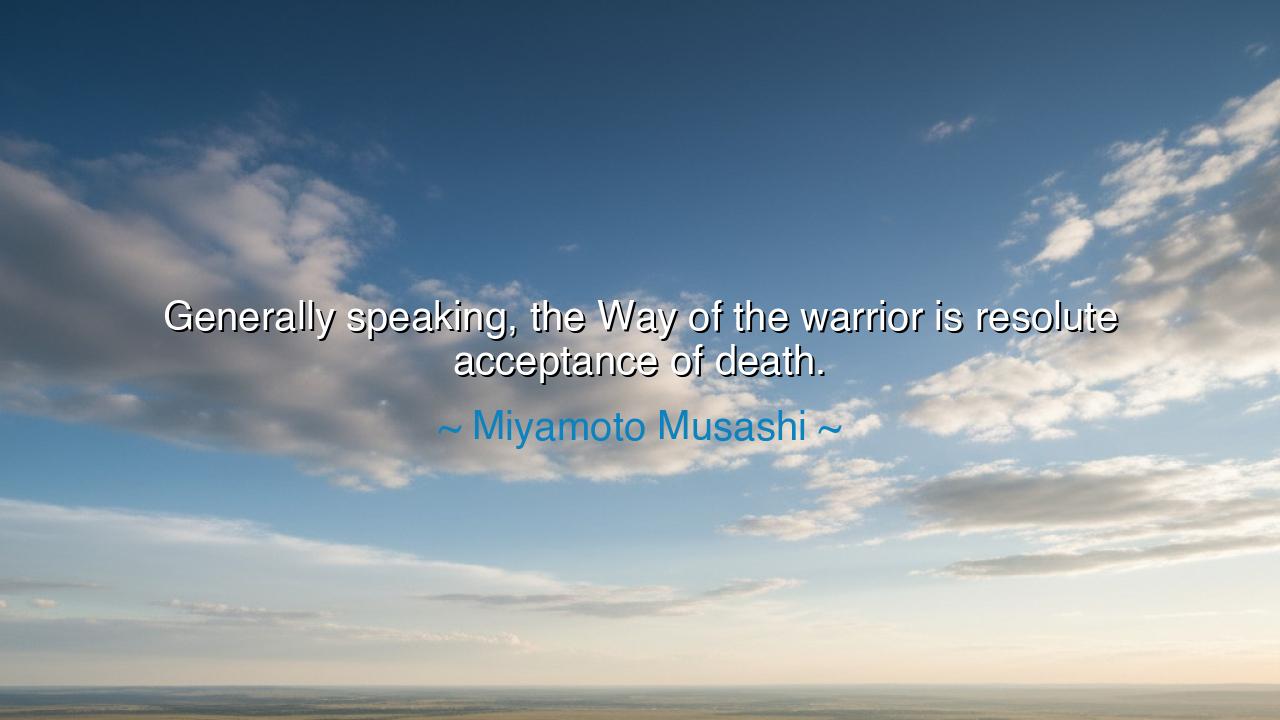
Generally speaking, the Way of the warrior is resolute acceptance






“Generally speaking, the Way of the warrior is resolute acceptance of death.” — so wrote Miyamoto Musashi, the undefeated swordsman of Japan, philosopher of the blade, and author of The Book of Five Rings. These words, carved from the stillness of a master’s mind, strike like steel against the heart. In them lies the essence of bushidō, the Way of the warrior — a life lived in harmony with death, a soul that finds freedom not by clinging to survival, but by transcending the fear of its loss.
Musashi, who lived by the sword in the age of samurai, knew well the fleeting nature of life. In battle, hesitation meant death, and fear of death meant defeat. Thus, he taught that the true warrior must learn resolute acceptance of death — not as despair, but as liberation. For only when one no longer trembles before mortality can one act with perfect clarity. The hand that fears to die cannot strike true; the mind that clings to life cannot be free. This acceptance is not a love of death, but the understanding that death is already part of life — and therefore, it cannot enslave the spirit.
In Musashi’s philosophy, the Way (Dō) is not only the path of battle, but the path of being. To live as a warrior is to walk daily beside death and yet to remain unshaken. He himself fought more than sixty duels, facing countless opponents, yet never suffered defeat. But his greatest victories were not over others — they were over himself. By conquering fear, he mastered both sword and soul. In his solitude, he wrote, “From one thing, know ten thousand things.” The one thing he meant was mastery of the self — and the first step toward that mastery is to meet death with calm resolve.
Consider the tale of the forty-seven rōnin, those masterless samurai who avenged their fallen lord. They knew that their act of vengeance would lead to their execution, yet they carried it out with unwavering honor. For them, death was not tragedy, but the rightful conclusion to their duty. When they surrendered themselves after their mission was done, they did so not as broken men, but as fulfilled warriors. Their calm acceptance of death transformed them from soldiers into legends. In dying, they lived forever — embodying the very spirit of Musashi’s words.
This ancient truth is not confined to the battlefield. In the broader sense, to accept death is to accept the impermanence of all things — the fading of youth, the loss of comfort, the passing of moments. The warrior’s spirit can dwell within every person who faces hardship without surrender, who endures loss without despair, who stands resolute even when the path ends in darkness. For Musashi’s wisdom speaks not only of the blade, but of the human heart: fear of loss is the root of weakness, and acceptance of it is the root of strength.
When one truly accepts death — not as enemy, but as companion — a strange peace arises. The warrior no longer wastes energy resisting what cannot be changed. Each breath becomes more precious, each act more deliberate. Life, seen through the lens of mortality, grows sharper, more radiant, more meaningful. The one who has made peace with death does not waste his days in hesitation or regret. He moves forward like water flowing toward the sea — unyielding, serene, unstoppable.
Thus, the teaching of Musashi endures across centuries: that freedom is born from acceptance, and courage from clarity. To follow the Way of the warrior is not to seek death, but to live so purely that death holds no dominion. The modern man or woman, too, must learn this art — to face uncertainty with calm, to act without fear, to love without clinging. Each day, practice letting go: of anger, of pride, of the illusion of control. Stand firm in truth, and walk your path with dignity.
For when you cease to fear the end, you begin to truly live. In the quiet heart of this paradox lies Musashi’s eternal lesson: that the Way of the warrior — and indeed, the way of all greatness — begins not with the sword, but with resolute acceptance of death. Embrace this truth, and life itself will bow before your spirit, granting you the peace, purpose, and strength that only the fearless can know.






AAdministratorAdministrator
Welcome, honored guests. Please leave a comment, we will respond soon